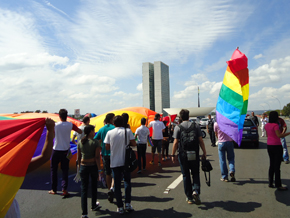I could debut this column as a permanent contributor to THE CAPE speaking of the growing wave of homophobia that we have witnessed in 2011, in several States, together with the rise of the influence of Christian religious fundamentalism that blocks the advancement of the LGBT agenda – and with increasing force.
Or, in a less pessimistic tone, I could start by celebrating the historic victory of May 5, 2011, when the Federal Supreme Court recognized homosexual stable unions as a family entity, in the biggest victory we have ever had in Brazilian lands, which paves the way for full legal equality, at least from the point of view of constitutional jurisprudence.
But, in the midst of this contradictory picture, where great achievements are dimmed by religious obscurantism, which does not respect the secularity of the State, I want to remember that this year we will have the 2nd National LGBT Conference, preceded by State Conferences (and sometimes regional, in some States ) – and some municipal ones, mainly in the capitals.
With the motto "For a Brazil free from poverty and discrimination: promoting the citizenship of lesbians, bisexuals, transvestites and transsexuals" the 2nd National Conference on LGBT Public Policies and Human Rights will be held, from December 15th to 18th, in Brasília.
The first Conference was a historic milestone. It took place between June 5th and 8th, 2008, also in the federal capital, and was attended by then president Lula, at the opening. Since then, there have been many advances. In 2009, the National LGBT Plan was launched. In 2010 the National LGBT Coordination was created and in 2011 the National LGBT Council was created.
Several states and some municipalities also launched public policy plans and established councils and executive bodies. Despite these advances, we are still far from a situation where the federal government, state governments and municipal governments have on their political agenda a commitment to actions to combat homophobia and affirmative citizenship policies for LGBT people.
Even the federal government, which has led these initiatives, has not yet been able to include either in the 2008 Plurianal Plan (PPA), or in the PPA proposal for 2012-2015, any specific thematic program related to combating homophobia. And the Multi-Year Plan is what organizes the Budget Laws, and gives the general outline of government priorities for the period. If we are not there, we will hardly have room in the budget.
Not to mention the sparse resources allocated to LGBT programs and actions in the federal budget, almost all of them (miniscule) concentrated only in the Human Rights Secretariat, – when this policy should permeate all government Ministries. In fact, in addition to discussing guidelines for combating poverty among LGBTs, the main objective of the National Conference is precisely to take stock of what has been done and what has not been achieved since the launch of the National Public Policy Plan in 2009.
And this charge must be extended to each governor. As well as every mayor and mayor. After all, policies to promote human rights are the responsibility of all managers, all executives. Homophobia happens in our city, in our state. For example, all public security policies are the responsibility of state governments.
In fact, if we are able to demand the federal government harshly, it is only because there is a Plan, a Council and an LGBT Coordination – in other words, something to be evaluated. Unfortunately, this does not happen in most city halls and state governments, which solemnly ignore the issue. Therefore, we must be clear: the conference process is not a panacea that will solve all our problems, nor is it innocuous.
Contrary to what some pessimists claim (whether in the LGBT movement or at universities), conferences are achievements of the LGBT struggle, of our movement in the broadest sense, which turns 31 years old in 2011. Conferences are not gifts from the State. These are gaps that were opened by the force of organized social struggle. They are spaces for dialogue and political advocacy with the Executive. They do not fail to represent, albeit timidly, a process of "recognition" and "participation", on the part of the Brazilian State, as they are measures of "justice", to use the concepts of thinker Nancy Fraser, with whom I identify.
Therefore, we are invited to engage, as citizens, in the debate at Municipal Conferences (some have already taken place), regional and State Conferences. Let's hold our mayors and governors accountable. Enough of homophobia, we need public policies. In São Paulo, the State Conference takes place in the capital, between October 28th and 30th. See you there.
*Julian Rodrigues, graduate in Literature, master's student in social sciences, LGBT activist, member of the National LGBT Council by ABGLT. He is from the Corsa group and Aliança Paulista LGBT.



